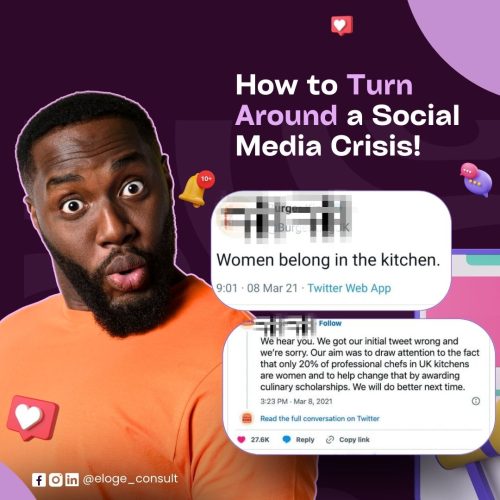Do you know 85% of customers trust online reviews as much as personal recommendations! Imagine coming online to see your brand being dragged in the mud from a single customer’s experience. Responding to a social media crisis effectively is crucial for your brand to maintain its reputation and trust among your audience.
Ideally, the best social media crisis management starts long before even any issue arises. Learn how to create a plan to mitigate risk and respond quickly. Here are some expert tips for handling a social media crisis:
- Act Quickly:
- Respond promptly to any negative comments, complaints, or issues raised on social media.
- Monitor social media channels regularly to detect potential crises early.
- Stay Calm and Professional:
- Avoid emotional reactions and respond in a calm, professional manner.
- Do not engage in arguments or confrontations online, this will affect how your brand is perceived by your followers.
- Acknowledge the Issue:
- Acknowledge the problem publicly and express concern for those affected.
- Demonstrate empathy and apologize to show your commitment to resolving the issue.
- Move the Conversation Offline:
- When appropriate, encourage individuals to share contact information privately to address their concerns more personally and avoid public escalation.
- Provide Accurate Information:
- Ensure that the information you share is accurate and verified to avoid spreading misinformation.
- Be transparent about the situation and what steps are being taken to address it.
- Monitor and Analyze:
- Keep a close eye on social media channels for ongoing developments.
- Analyze the situation to understand its impact and make adjustments to your crisis management plan as need
- Learn and Improve:
- After the crisis is resolved, conduct a thorough analysis to understand what went wrong and how to prevent similar issues in the future.
- Implement changes and improvements based on lessons learned.
- Train Your Team:
- Ensure that your social media team is trained to handle crisis situations effectively.
- Conduct regular drills to keep everyone prepared and informed.
- Maintain Consistent Messaging:
- Ensure that your messaging is consistent across all channels to avoid confusion.
- Clearly communicate any updates or changes in the situation.
- Showcase Positive Actions:
- Share any positive actions or steps taken to address the issue to rebuild trust.
- Highlight your commitment to customer satisfaction and improvement.
- To Stay Ahead, have a Crisis Plan in Place:
- Develop a comprehensive social media crisis management plan in advance.
- Clearly define roles and responsibilities for team members involved in crisis response.
Book a 15 minute brand review session now with our team.
Crisis Management Plan: Questions to Ask
- Who are the decision makers in your company?
Detail their roles and responsibilities in the event of a crisis. It could be your CEO, head of legal and shareholder, for example. This needs to be updated if there is an organizational shift. Your document should contain contact details of key decision makers. This is not a document that will be widely shared, so include emergency out-of-office contacts.
- What will you do if the decision makers are away?
If your CEO is in hospital or out of the country and unavailable, can your CTO take decisions in her place? This issue needs to be clearly and concisely detailed in your document. What is your “out of office hours” emergency plan? Be sure that the people included in this are aware and compensated appropriately.
- What are your key communication channels?
If your brand has a presence on numerous channels, you might want to pick one to communicate your crisis-handling message. This depends on whether you have a large team to handle community management on each channel. If you don’t, then it could be better to keep it to one channel and handle it well.
- Do you need to get statements approved by legal/compliance?
Honestly, you probably do. If your social media crisis has any kind of magnitude, you should get your posts and answers approved. Social media users are very savvy at taking screenshots and recording brand responses, so you won’t be able to take them back once they’ve gone live.
- Who will handle social media?
This is an incredibly important part of your planning, especially in a large organization where you may have multiple social and community managers. One person should oversee proactive messaging and remain in direct contact with the decision makers. Of course, it’s essential that this person brief the rest of the social media team on the ongoing crisis, what they should do and how they should be responding to client messages on social media.
- Who will brief the company?
You don’t want your employees jumping into social media arguments, causing confusion, answering journalists or making statements. If in doubt, ask employees to report concerns or enquiries to the decision makers mentioned in the planning documentation. Reassure them and keep them informed of your actions.
Remember, every social media crisis is unique, so flexibility and adaptability are key. Tailor your response to the specific situation and always prioritize open communication and resolution.
Need help developing a Social Media Crisis Management Plan? Send your request via info@eloge-consult.com or call 0814 219 1920
